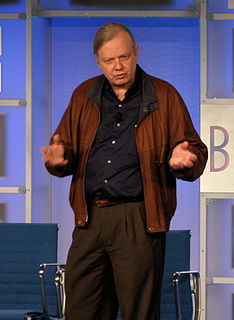A Quote by Paul Allen
Computers are really, basically, computing elements and a lot of memory. They are pretty easy to understand, as compared to the brain, which was designed by evolution.
Related Quotes
Computers and computing are all around us. Some computing is highly visible, like your laptop. But this is only part of a computing iceberg. A lot more lies hidden below the surface. We don't see and usually don't think about the computers inside appliances, cars, airplanes, cameras, smartphones, GPS navigators and games.
Because we do not understand the brain very well we are constantly tempted to use the latest technology as a model for trying to understand it. In my childhood we were always assured that the brain was a telephone switchboard...Sherrington, the great British neuroscientist, thought the brain worked like a telegraph system. Freud often compared the brain to hydraulic and electromagnetic systems. Leibniz compared it to a mill...At present, obviously, the metaphor is the digital computer.
By 2020, most home computers will have the computing power of a human brain. That doesn't mean that they are brains, but it means that in terms of raw processing, they can process bits as fast as a brain can. So the question is, how far behind that is the development of a machine that's as smart as we are?
There is also a particular area of sleep called slow-wave sleep. I immediately liked this idea. It turns out this part of sleep is where the brain basically gets into step with itself and gets into this one single phase of these relatively slow brain waves - around 10 Hz or so - and the whole brain 'fires all at once'. This is a brilliant bit of sleep where we consolidate memory and learning, and memory is one of my obsessions really.
Now, the reason that we think computer science is about computers is pretty much the same reason that the Egyptians thought geometry was about surveying instruments. And that is, when some field is just getting started and you don't really understand it very well, it's very easy to confuse the essence of what you're doing with the tools that you use.
Mind mapping is a technique based on memory and creativity and comprehension and understanding, so when the student or a child uses the mind map, they are using their brain in the way their brain was designed to be used, and so the mind helps them in all learning and cognitive skills. It simply helps them in what the brain does naturally.
There's basically an element of fiction in everything you remember. Imagination and memory are almost the same brain processes. When I write fiction, I know that I'm using a bunch of lies that I've made up to create some form of truth. When I write a memoir, I'm using true elements to create something that will always be somehow fictionalized.
The power efficiency of computing has improved by a factor of a billion from the ENIAC computer of the 1950s to today's handheld devices. Fundamental physics indicates that it should be possible to compute even another billion times more efficiently. That would put the power of all of today's present computers in the palm of your hand. That says to me that the age of computing really hasn't even begun yet.


































